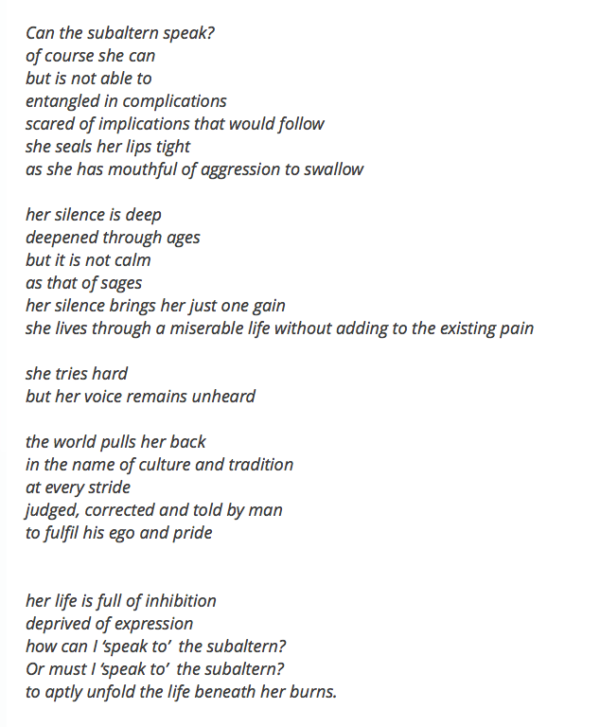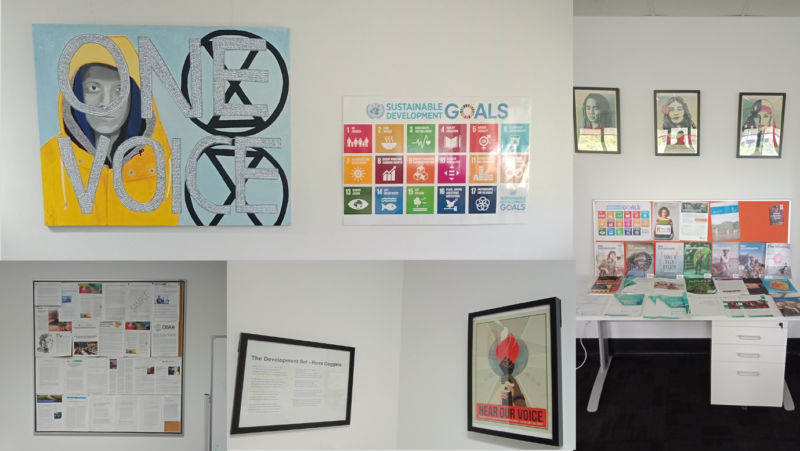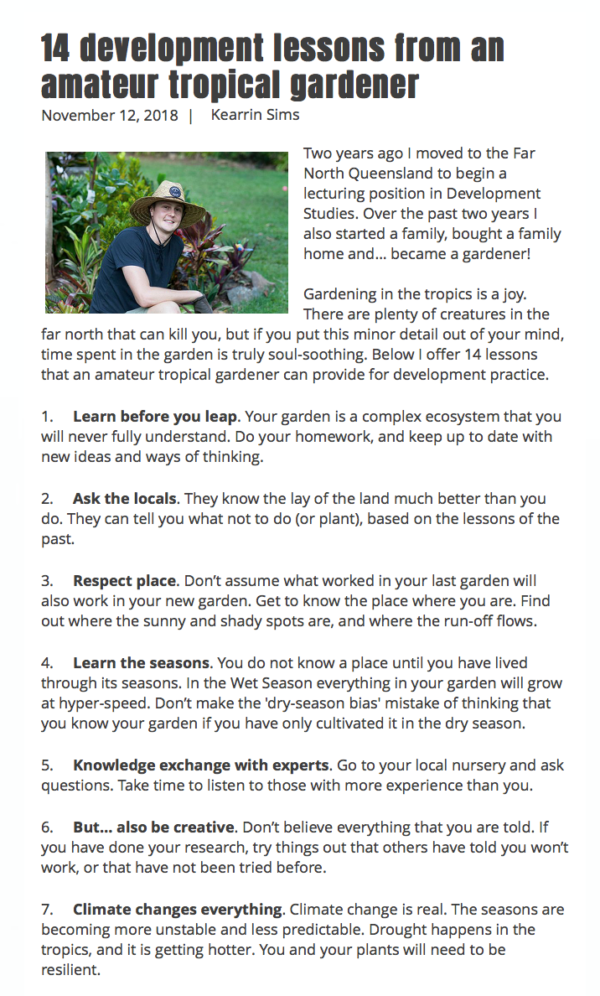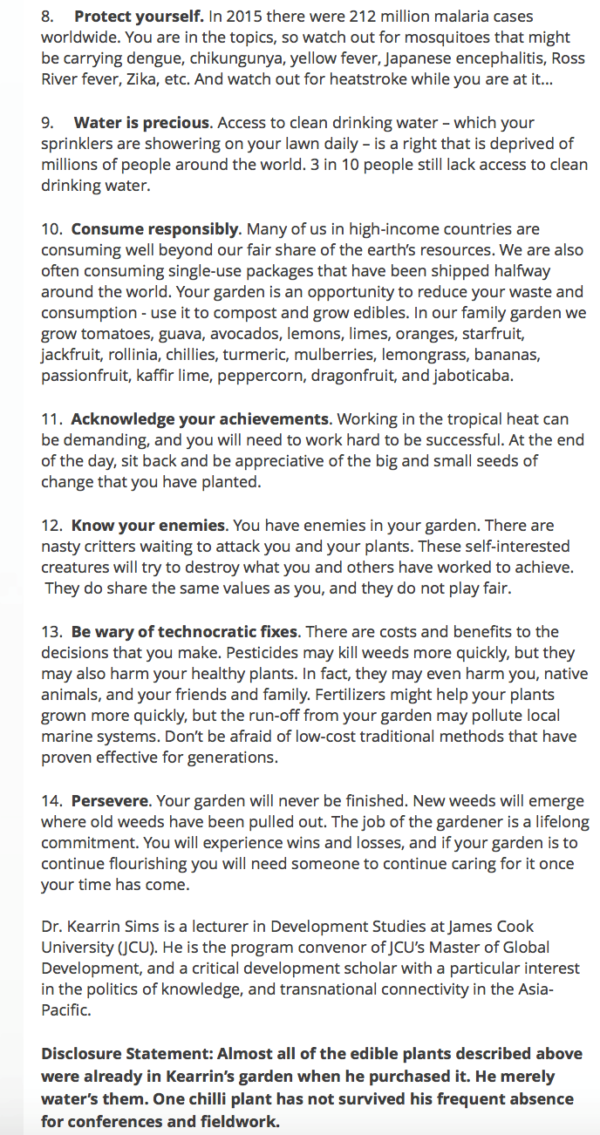Kearrin Sims
It has long been recognised that development studies must strike a balance between a critical (perhaps radical) interrogation of development, and the delivery of practical skills for undertaking development work. These two undertakings are, of course, interrelated. Good development practice is informed by a sound understanding of relevant theory, and theoretical debates need to be attentive to shifts in policy and practice. As Harris notes, development studies seeks to both understand ‘how and why the social world is constituted’, and to provide strategies and interventions that are intended to bring about change (2005: 18).
In addition to practical and theoretical skills, recent thinking on development studies has argued for the importance of pedagogies that embrace emotions and deeper embodied experiences of understanding and doing development (Tschakert et al. 2018).
For Tschakert et al., incorporating affective, ‘more-than-rational’, dimensions of learning and teaching can assist in both re-instilling ‘a sense of hope and purpose’ into the teaching of development and ‘make possible more humane, empowering, and just development outcomes’ (2018: 187).
In this post, I offer 3 ways in which I seek to bring affective engagements with development into the classroom.
1. Creative Learning
One effective means to engage with the more-than-rational dimensions of development is to create (more) space for creative learning exercises and assessment. There are lots of ways to do this, but one simple method that I have found useful is to encourage students to write poetry about a development topic/issue of their choosing. Poetry is a deeply affective form of writing, and in my experience encouraging students to produce such ‘non-academic’ (read: non-rationalist) outputs opens up new avenues of thinking that (often) reveal one’s own values, motivations, and biases. In short, writing poetry is a deeply reflexive exercise.
The idea to introduce poetry into my classroom actually came from a student, who included a poem as part of a reflexive diary assessment. Since then, I have encouraged all of my students to write a poem as a tutorial exercise. I don’t grade the exercise, but I do award prizes (novels brought from a second-hand store) to my personal favourites.
I am not a poet (and I know it), so in order to put myself through the same embracing of vulnerability that I ask of my students – in reading their poems aloud in front of peers – in 2020 I wrote my first ever poem and read it aloud to my own peers at the Development Studies Association of Australia (DSAA) inaugural conference. The DSAA attracts a kind and collegial cohort, but it was still quite a nerve-racking experience! Below is a copy of my poem and two much more insightful examples written by students.

Poem by Kearrin Sims

Poem by Arrushi Doomra


Poem by Megan Butterworth
2. An Inspiring Learning Environment
‘University academics… have distanced themselves from demands for relevance by retreating behind a pose of a priori importance. They have shunned the responsibility of seducing their audiences…’
– Alain de Botton (2012: 161).
Higher Education (in Australia) does not provide the most conducive conditions for creating an inspiring learning environment. Timetabling requirements often see us changing classrooms from semester-to-semester, and we are frequently teaching in tired buildings. Nonetheless, there are many ways for us to address this. Field-based learning provides a means for students to get off campus and to interact with people and places of significance to their fields, but even for more ‘traditional’ subjects simply delivering a tutorial in a shady outdoor campus space or, (as I have learnt from colleagues at UON), having students remove their shoes and sit in a circle to engage in dialogue together, can radically alter the learning environment.
At JCU, I am privileged to have a ‘fixed’ space to deliver core subjects in the Master of Global Development, and I am slowly working to make our classroom into a more inspiring environment. Paintings (your own, those of students, or free downloads such as these), protest signs, conference resources, ACFID and RDI Network resources, academic Journals, local (preferably native) flowers, and print outs of relevant staff publications can all be useful to turn a classroom into a more welcoming and inspiring space of co-learning.

JCU’s Master of Global Development Room
3. Life-long learning and beyond-the-classroom sensibilities
As Jakimow (2015) and others have noted, working in development requires a commitment to life-long learning. The challenges we seek to interrogate and address are everchanging, and sometimes so complex (wicked) that it is hard to even grasp what exactly the challenge is – let alone how best to respond.
One way to promote inter/multidisciplinary thinking and new development possibilities is to encourage students to apply development theories to everyday aspects of their lives – and vice versa – to draw on seemingly unrelated life experiences to try and better understand development challenges. Here, the drawing together of classroom learning with personal experience opens up space for the cultivation of deeper development sensibilities. One such example that I share with my students, and ask them to contribute to, is the below piece that I developed while working in my garden.


All of the above ideas have emerged from conversations with students and colleagues. There are so many more ways that development studies pedagogy can encourage affective and reflexive learning that brings together critical and practical skill development. If you have other examples to share, please consider submitting a piece to this blog by emailing kearrin.sims@jcu.edu.au
For details on submission requirements click here.
Kearrin Sims is a lecturer in development studies at James Cook University (JCU), and coordinator of JCU’s Master of Global Development. He is also an executive committee member of the Development Studies Association of Australia and the Research for Development Impact Network.
For more on Kearrin’s work see:
www.rethinkingdevelopment.net
research.jcu.edu.au/portfolio/kearrin.sims/
www.researchgate.net/profile/Kearrin_Sim
